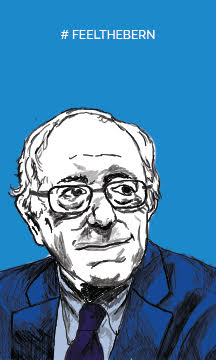
People are pissed off. The middle class has been shrinking ever since the 1980s, Wall Street has purchased Congress, the environment is on the verge of collapse, African Americans cannot walk their own streets without fear of police repression and students like us are drowning in debt while the rich have seen their wealth skyrocket to levels that have never been seen before.
Calling for a “nationwide political revolution,” Senator Bernie Sanders has managed to make the upcoming Democratic primary a real competition. Before he made waves with his strong middle class message, 2016 was supposed to be the year of Queen Hillary Clinton’s coronation. But the narrative has shifted.
In early August, 27,000 people showed up in Los Angeles to hear him hammer out his message, a gathering five times as large as any Hillary Clinton rally to date.
With his popularity jumping from 12 percent in July to 30 percent in August according to FOX and CNN polling, Sanders is now being called a “threat” and a “contender” by the media rather than a “long shot.” All over the country, Sanders has campaigned for free college tuition, a ban on private prisons, a $15 minimum wage, healthcare for all and – wait for it – a constitutional ban on big money in politics.
Unlike some other 2016 candidates, Sanders hasn’t taken a dime from what he calls “the billionaire class,” and he refuses to collaborate with super political action committees (PACs). Instead, he raised over $15 million from mostly small donors, according to the Federal Election Commission’s 2015 second-quarter reportings.
Refusing to fraternize with the wealthy and powerful is an extension of Sanders’ general contempt for wealth inequality, which, as he frequently mentions, is at its highest since the Great Depression. In a recent interview with the New York Times, Sanders called out the nation on its “grotesque level of income and wealth inequality where the top one-tenth of one percent owns almost as much wealth as the bottom 90 percent.”
To bring Bernie’s message to the U, the University of Miami Young Democrats should hold a public Democratic primary debate or discussion where students can exchange their feelings on the 2016 election.
The more people who hear about Bernie’s message, the more people will support him, evidenced by his strong momentum in the polls. Students identify with his views because we know that this is not a joke. It’s our future.
#FeelTheBern.
Lucas Baker is a sophomore majoring in economics, international studies and political science.
Correction 5:30 p.m., Sept. 3, 2015: The story originally stated that Bernie Sanders raised “over $13 billion from mostly small donors,” which is incorrect. The correct amount is $15 million.





